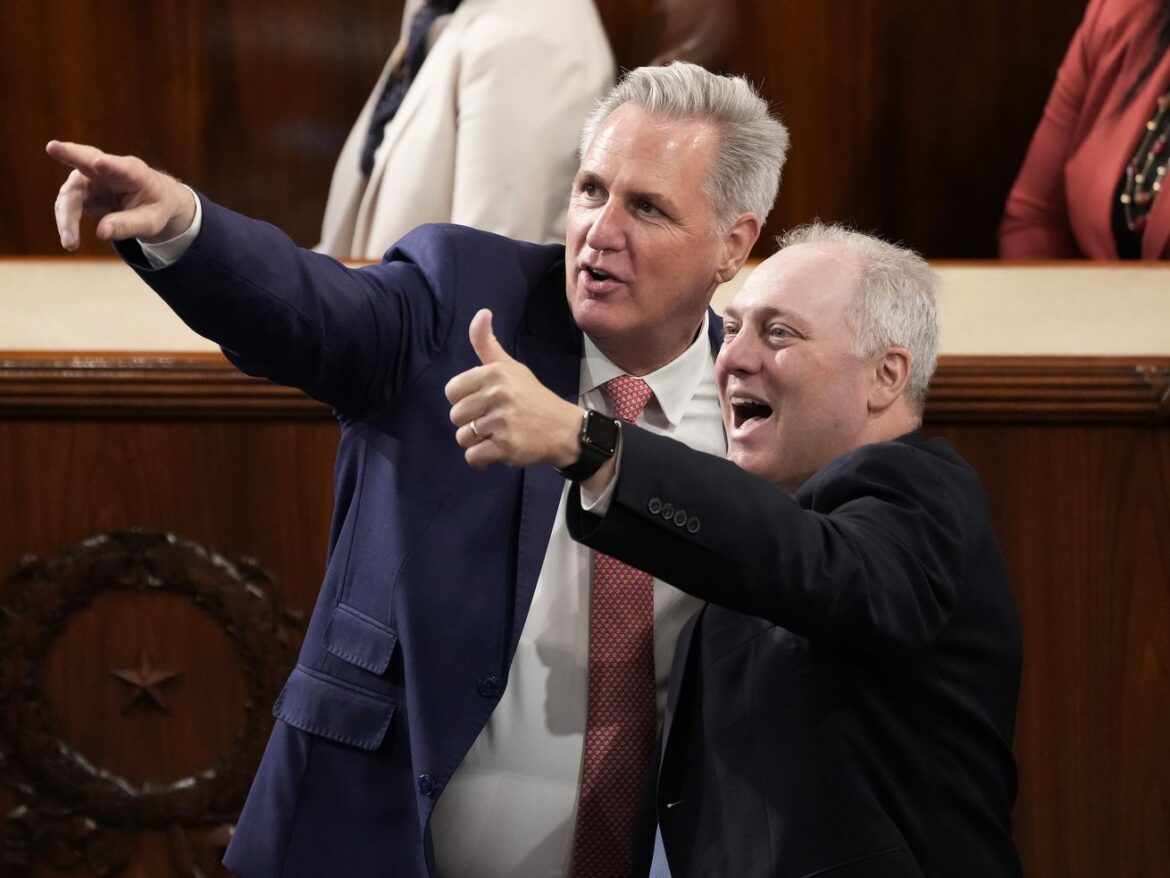He won the first stage of the speaker of the House vote. Then the bad news started pouring in.
For a brief moment, many Republicans hoped the party’s nomination of Rep. Steve Scalise (R-LA) for speaker of the House could quickly unite their fractious conference.
That was a pipe dream.
Scalise narrowly triumphed Wednesday in the first step of the speaker election process, an internal vote among House Republicans. That win meant he’d be the party’s nominee for the next step: the speaker election vote on the House floor.
But on Thursday, the extent of the difficulty he’ll face in attaining the near-unanimous House GOP support he needs for that floor vote became clear as problem after problem piled up.
With Democrats unanimously opposed, a mere five Republican defections is enough to block Scalise from winning on the House floor — and at least 19 have already said they won’t vote for him, according to CNN’s Haley Talbot. Most (though not all) of this opposition is coming from right-wing hardliners who prefer Rep. Jim Jordan (R-OH). Jordan conceded and pledged to support Scalise after the House GOP’s internal vote Wednesday, but his supporters aren’t all going along.
Take for instance Donald Trump, who endorsed Jordan last week. During a radio interview, Trump argued that Scalise’s recent blood cancer diagnosis meant he was in “serious trouble” and should focus on getting better.
Then former speaker Kevin McCarthy — who reportedly had a tense relationship with Scalise, his No. 2, this year — undercut his would-be successor Thursday. When asked whether Scalise would come up with the votes he needs: “It’s a big hill,” McCarthy said. “He told a lot of people he was gonna be at 150 [in the internal party vote],” McCarthy continued, “but he wasn’t there.” (Scalise beat Jordan by just 113 to 99.)
The timeline for moving forward on the speaker vote is now totally up in the air. Because of this, some frustrated House GOP establishment figures are now floating the unthinkable: asking Democrats for help. House Minority Leader Hakeem Jeffries (D-NY) has said he’d be open to finding “a bipartisan path forward” to “reopen the House,” but most Republicans would be deeply reluctant to go there unless they conclude the hard right has truly left them no choice.
Steve Scalise’s 24 hours of humiliation
After Scalise won the House GOP conference vote early Wednesday afternoon, things were looking up for him at first. Rep. Matt Gaetz (R-FL), who’d spearheaded the effort to depose McCarthy, was on board. “Long live Speaker Scalise,” Gaetz told reporters.
And though Jordan was initially cagey about whether he’d back Scalise, he agreed to do so just about an hour later, saying he’d help nominate Scalise on the House floor. There was even talk that the House could hold its speaker vote that afternoon.
That didn’t last long; it quickly became clear Scalise didn’t yet have the votes he needed.
Reps. Lauren Boebert (R-CO), Thomas Massie (R-KY), and Max Miller (R-OH) all announced they would not vote for Scalise on the floor. Rep. Marjorie Taylor Greene (R-GA) said the same, citing Scalise’s cancer. “I like Steve Scalise, and I like him so much that I want to see him defeat cancer more than sacrifice his health in the most difficult position in Congress,” she wrote.
Rep. Nancy Mace (R-SC) then went on CNN to say that she’d oppose Scalise on the floor. Mace argued that old Scalise scandals — his 2002 speech to a group founded by white supremacist David Duke and an alleged comment Scalise made around that time that he was Duke “without the baggage” — disqualified him.
Later Wednesday, Rep. George Santos (R-NY) — fresh off his latest indictment — posted on X that he had had “0 contact or outreach” from Scalise and that he’d oppose him “come hell or high water I won’t change my mind.”
The news got worse on Thursday as Scalise began losing the votes of some members who’d said Wednesday that they would back him, including Rep. Anna Paulina Luna (R-FL) and Rep. Eli Crane (R-AZ). Further “no” votes piled in too.
Most of the holdout members are still backing Jordan, and their most common complaint is that Scalise represents a continuation of the GOP’s establishment leadership and that a greater shakeup is necessary. Rep. Carlos Gimenez (R-FL), meanwhile, is still saying he’ll only cast his ballot for McCarthy on the House floor.
What happens next is up in the air. Any number of possibilities are in play. Scalise could cut deals with the right and lock down enough holdouts. There could be a protracted staredown with Jordan’s forces, either prior to a floor vote or in multiple rounds of ballots on the floor. Perhaps Scalise could quit and the conference could simply back Jordan, with Scalise’s supporters accepting that the hardliners are more intractable than they are. Alternatively, a new dark horse candidate could arise.
And there’s even that prospect of a deal with Democrats. Rep. Mike Rogers (R-AL) said that the GOP might never get 217 votes for a speaker due to “traitors” in the conference and that Democrats must help.
Rep. David Joyce (R-OH), meanwhile, said that perhaps a deal could be cut with Democrats to make Rep. Patrick McHenry (R-NC), currently serving as speaker pro tempore, officially the speaker on a short-term basis. That could get the chamber — and the country — through the next government funding deadline in mid-November.
Such a deal would draw right-wing fury. But if the hard right is truly implacable, what other choice would the Republican establishment have?
